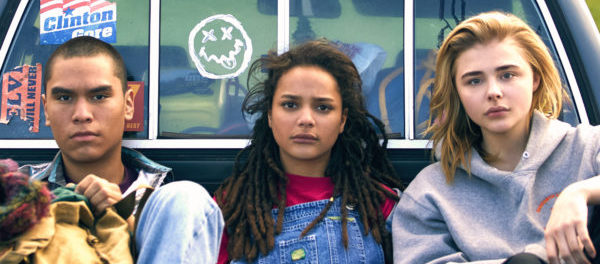The Miseducation of Cameron Post: Pray the Gay Away…NOT
The new film The Miseducation of Cameron Post is set in 1993 and sadly, despite all the progress made by the LGBTQ community since that time, the subject matter it explores seems just as relevant as ever. Directed by Desiree Akhavan, this provocative and thought-provoking drama took home this year’s Grand Jury Prize at the prestigious Sundance Film Festival. It’s based on the 2012 book of the same name by Emily M. Danforth and stars well-known young actress Chloë Grace Moretz (Kick-Ass, Hugo, Carrie, Clouds of Sils Maria), Sasha Lane, Jennifer Ehle, John Gallagher Jr., and Forrest Goodluck.
The plot centres on Cameron, a teen who is caught making out with her girlfriend in the back of a car during prom night. Because her parents are both dead, her aunt, who acts as her guardian, sends her away to a conversion camp out in the country in hopes of “praying the gay away”. Once there, Cameron meets an array of young people sent there against their will to be rehabilitated. Fellow campers include Jane, an amputee with a habit of sneaking off to smoke weed, and Adam, who identifies himself as being Two-Spirited, which he says wasn’t an issue at first – that is, until his father decided to go into politics and sent him to the camp to suppress his feminine traits and make him more butch.
The Miseducation of Cameron Post owes a lot to the flick But I’m A Cheerleader (1999), which dealt with similar subject matter but in a much more comic way. Unlike that film, there is nothing funny about what happens to Cameron Post and the rest of the teens sent to God’s Promise, a Christian conversion camp aimed at curing them of their homosexual impulses. The young men and women are taught that their same sex attractions are merely the tip of the iceberg in terms of masking their true underlying problems. The counselors insist that under the surface the teens are all battling bigger issues such as gender confusion (illustrated by a hilarious flashback scene featuring a father and daughter watching a Vikings football game), which must be addressed before they can be truly cured of their perversions.

The Miseducation of Cameron Post
During one of Cameron’s therapy sessions, the main counselor, a sour woman named Dr. Lydia Marsh, tells Cameron that the first step in her recovery is to stop thinking of herself as a homosexual. Cameron replies, “I don’t think of myself as a homosexual. I don’t really think of myself as anything.” This answer is particularly insightful because it not only illustrates Cameron’s youth but also her lack of experience in terms of the nuances of her developing sexuality. It’s obvious that the young woman sees nothing morally wrong with having a lesbian relationship even though it was the reason her guardian sent her away to the conversion camp.
What becomes more and more obvious as the movie progresses is that most of the teens staying at the camp are aware of the absurdity of their situation and yet realize that they must play along in order to get released. They attend meetings, go to classes, and for the most part do what they’re told. They’re insightful enough to realize that the whole concept of the conversion camp is a fraud and being gay isn’t a choice, a sin, or the tip of the iceberg hiding deeper issues. Most of the students are really just playing a game by letting the adults think that therapy is working and hoping that if they do it for long enough, sooner or later they’ll be rewarded by being allowed to go home. Of course, this doesn’t always work out. In one particularly moving scene, a male student who thought he would be leaving the camp is informed by his father that he still thinks his son is “too feminine” to be welcomed back into the fold. After he has a breakdown, Cameron confronts the counselors and confirms her belief that neither the doctor nor her reformed gay reverend brother really know what they’re doing, nor do they seem aware of what the damaging consequences of their brand of religious therapy will be on certain vulnerable individuals.

The Miseducation of Cameron Post
Chloë Grace Moretz delivers a standout performance in The Miseducation of Cameron Post. The actress subtly yet realistically gives filmgoers a glimpse into the angst of what it’s like to be a young person on the brink of adulthood struggling to figure out her identity and find her place in the world, while at the same time being shamed and told that her feelings are sinful and contrary to God’s laws. Indeed, throughout the film, Cameron doesn’t seem to feel the least bit guilty about being involved in a same sex relationship. Instead, her pain is caused by other people’s reactions upon finding out about her lesbian feelings.
The Miseducation of Cameron Post is an important film. Set twenty five years ago, it’s hard to believe that despite strides such as the legalization of same sex marriage, there is still a widespread perception that homosexuality is a choice and that a person’s sexual orientation can be changed through prayer and other therapeutic techniques. Perhaps The Miseducation of Cameron Post will shed some light on the absurdity of such beliefs and encourage parents and other members of the community not to shun or shame their LGBTQ family members or friends but rather to accept, support, embrace, and love them for the authentic human beings they were born to be.
The Miseducation of Cameron Post is now playing in theatres.






